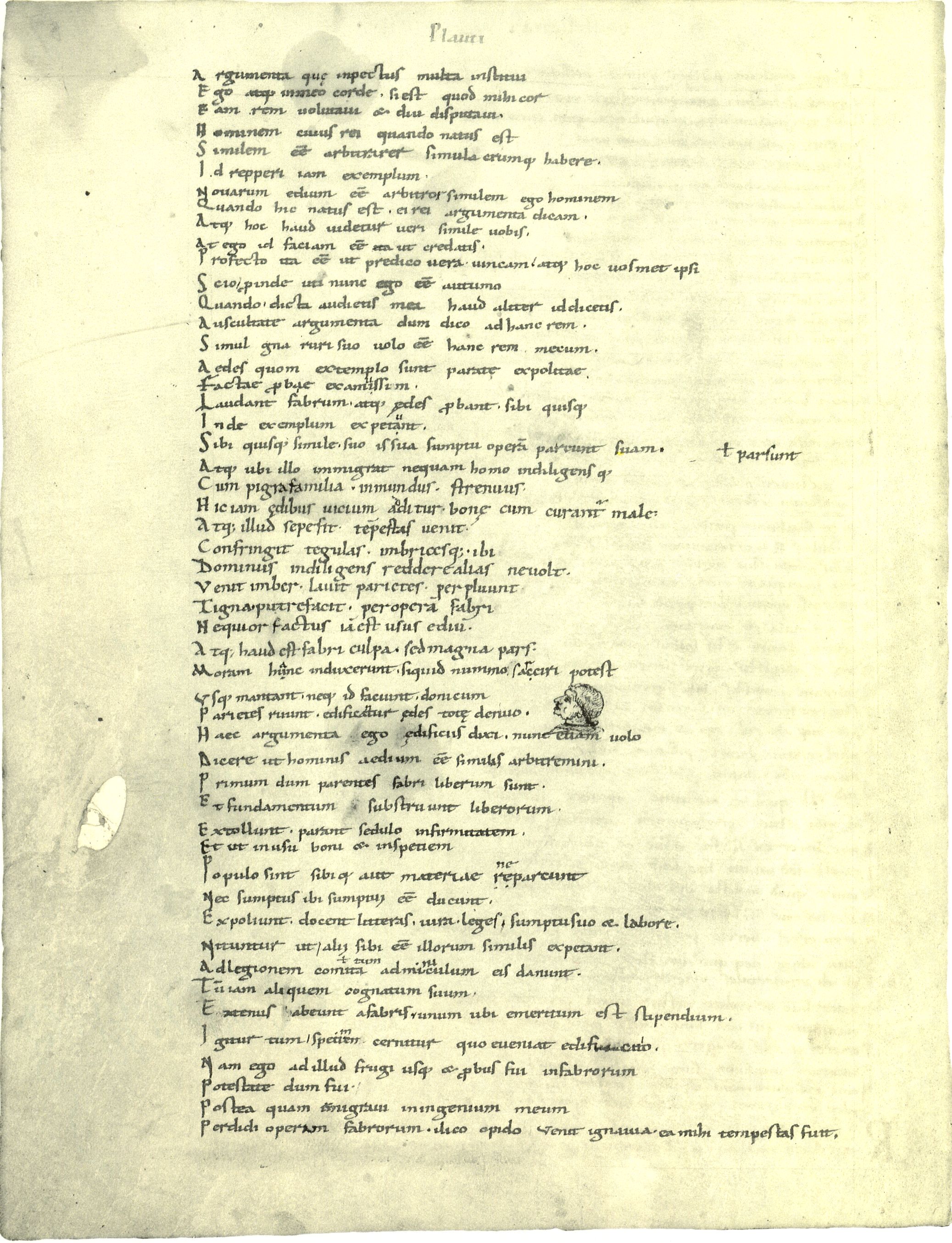Roman Author Plautus
Posted By admin On 13/04/19Roman writers were heavily influenced by Greek literature. Early Latin writers translated and adapted Greek forms for Roman audiences, beginning after the 1st Punic War (264-241) with Livius Andronicus (284-204? B.C.) whose works have not survived. In turn, Shakespearean comedy is indebted to the early Latin playwright Plautus. Over time, the Latin writers developed their own genres, most notable of which is satire.

- The Roman theatre at Ephesus, setting for Shakespeare's Comedy of Errors. Photograph Peter Smith. Many characters from classical comedy are memorable:.
- Titus Maccius Plautus (/ ˈ p l ɔː t ə s /; c. 254 – 184 BC), commonly known as Plautus, was a Roman playwright of the Old Latin period. His comedies are the earliest Latin literary works to have survived in their entirety.
414 Roman Comedy I (Plautus), Classical Drama and Theatre. The turning point in Roman drama came in 240 BCE, when a Greek-speaking slave living in Rome, Livius Andronicus, translated Homer's Odyssey into Latin. Hindi remix songs mp3 download 2012.
Roman Authors from the 3rd Century B.C. (299-200)
- Livius Andronicus (284-202?)
- Naevius (270-201)
- Plautus (254-184)
- Ennius (239-169)
- Cato (234-149)
- Marcus Pacuvius (c.220-c.130)
Roman Authors from the 2nd Century B.C. (199-100)
- Terence (195-159)
- Lucilius (180-02)
- Varro (116-27)
- Nepos (110-24)
- Cicero (106-43)
Roman Authors from the 1st Century B.C. (99-0)
- Varro (116-27)
- Nepos (110-24)
- Cicero (106-43)
- Caesar (100-44)
- Lucretius (94-52)
- Hirtius (90-43)
- Catullus (87-54)
- Sallust (86-35)
- Vergil (70-19)
- Gallus (66-26)
- Horace (65-8)
- Augustus (63 B.C.-14 A.D.)
- Livy (59 B.C.-A.D.17)
- Tibullus (55-19)
- Sulpicia Contemporary of Tibullus
- Propertius (c.50 - c.16 B.C.) Also contemporary with Tibullus
- Ovid (43 B.C.-A.D. 17)
- Seneca (4 B.C.-A.D. 65)
Roman Authors from the 1st Century A.D. (0-99)
- Augustus (63 B.C.-14 A.D.)
- Livy (59 B.C.-A.D.17)
- Ovid (43 B.C.-A.D. 17)
- Seneca (4 B.C.-A.D. 65)
- Phaedrus (14-54)
- Pliny the Elder (23-79)
- Petronius (27-66)
- Persius (34-62)
- Quintilian (35-100)
- Lucan (39-65)
- Martial (40-104)
- Statius (45-96)
- Juvenal
- Tacitus (56-120)
- Pliny the Younger (61-111)
- Suetonius (75-150)
Roman Authors from the 2nd Century A.D. (100-199)
- Quintilian (35-100)
- Martial (40-104)
- Juvenal (47-130)
- Tacitus (56-120)
- Pliny the Younger (61-111)
- Suetonius (75-150)
- Aurelius (121-180)
- Apuleius (124-170)
- Gellius (130-170)

Mostellaria is a play by the Roman author Plautus. Its name translates from Latin as The Haunted House (with the word Domus understood in the title). It is a comedy with a very linear plot. It is set in the city of Athens, on a street in front of the houses of Theopropides and Simo.
- 1Characters
Characters[edit]
Ancient Roman Author
Main characters[edit]
- Theopropides - an Athenian merchant
- Philolaches - Theopropides' son
- Tranio - Slave owned by Theopropides
- Philematium - A courtesan who has been set free by Philolaches
- Callidamates - Friend of Philolaches
- Simo - Theopropides' neighbour
- Misargyrides - A moneylender
Minor characters[edit]
- Grumio - Country slave, owned by Theopropides
- Sphaerio - Slave owned by Theopropides
- Scapha - Philematium's attendant
- Delphium - Callidamates' girlfriend
- Phaniscus - Callidamates' slave
- Pinacium - Caliidamates' slave
Plot[edit]
A young man named Philolaches is having a great time while his father is overseas on business. Philolaches has also borrowed a lot of money to buy the freedom of the slave-girl he loves. One day he is having a house party with many friends, when his slave Tranio interrupts the merry-making to announce that Philolaches' father has returned unexpectedly and will arrive from the harbour at any minute. Amid the general panic, Tranio has an idea. He hustles Philolaches and his friends into the house and locks the door. The father now arrives. Tranio greets him respectfully but pretends that it is dangerous to enter the house because it is haunted.
Unfortunately, at this moment a money-lender turns up to claim the money that Philolaches borrowed. Tranio thinks quickly and pretends that the money was borrowed to buy the house next door. Even when Philolaches' father meets the real owner of the house, Tranio manages to hide the truth for some time, but he is found out at last and jumps onto the top of an altar to escape punishment. All ends happily, however, when one of Philolaches' friends offers to repay the debt, thus allowing the father to forgive his son. Even Tranio is forgiven.
Adaptations[edit]
Keith Lawrence Roman Author
-'Mostellaria' is one of several Plautus plays used as inspiration for the Stephen Sondheim, Burt Shevelove and Larry Gelbart musical 'A Funny Thing Happened on the Way to the Forum'. The character Erroneous returns from being abroad to be told his house is haunted and must walk seven times around the seven hills of Rome to remove the ghosts.
Bulk sms free download for pc. Technical), no special knowledge required for operating. International free mass sms broadcasting software can send thousands of messages from. Infinite contacts without necessity of internet connection. Bulk sms promotion program can easily understandable by everyone (technical.
-Kevin P. Joyce's play 'When the Cat's Away' is loosely based on 'Mostellaria', transposing the story from Athens to modern day Nantucket.

References[edit]
- Plautus, The Rope and Other Plays, translated by E. F. Watling, Penguin, London, 1964, ISBN0-14-044136-0.